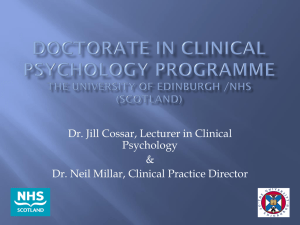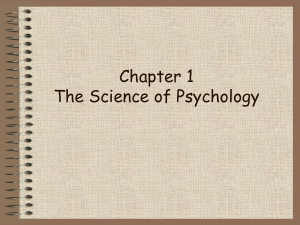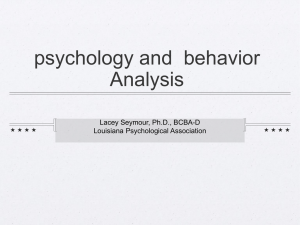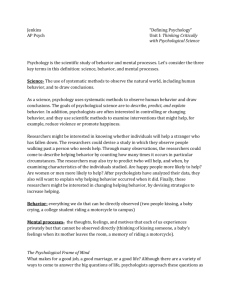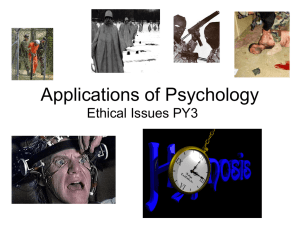2011 D Clin Presentation
advertisement
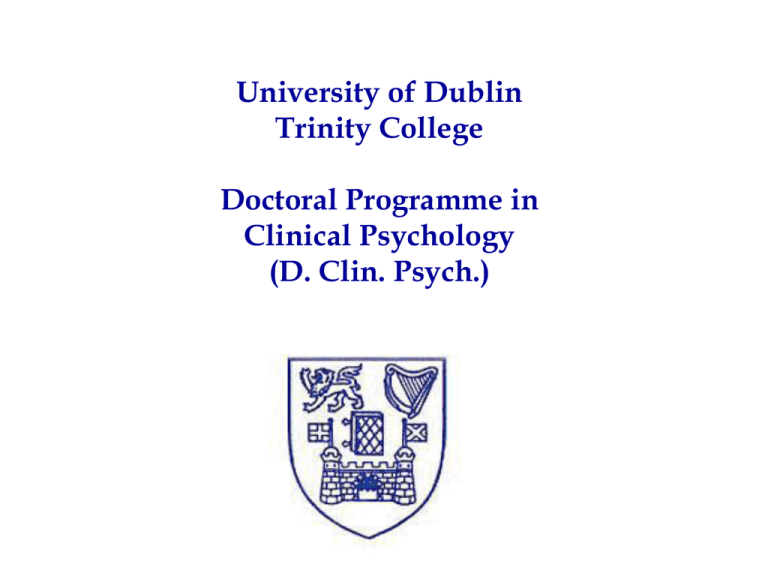
University of Dublin Trinity College Doctoral Programme in Clinical Psychology (D. Clin. Psych.) Why Choose TCD? • Integration of Academic/Clinical/Reflective practice • Promotion of active involvement of trainee – Development of own interests • Acceptance of different models • Partnership with HSE and others Course Staff Head of School: Dr. Howard Smith Course Director: Dr. Kevin Tierney Lecturers: Dr. Charlotte Wilson Dr. John O’Connor Lecturer in Statistics & Methodology: Dr. David Hevey Director of Clinical Coordination: Sinead Fitzgerald Clinical Co-ordinator: Mary Fell John Davenport Course Administrator: Ann Matthews Course Secretary: Sheila McCormack Course to-date • The course or its predecessors (the BPS Diploma course & the M.Sc in clinical psychology) have been in existence on a continuous basis since 1979. • The course is responsible for the training of more than 30% of the clinical psychologists in Ireland who hold formal qualifications. • Graduates of the course work throughout all of the health boards, the voluntary sector, the prison service, the education sector and university sector. Course Objectives • To train clinical psychologists who will possess the following qualities: – A broad based approach – Ability to work with a wide range of client groups – High quality research skills & ability to apply them to clinical practice. – Good understanding the context in which clinical psychologists operate – Highly developed interpersonal skills – Effective communication skills – Ability to contribute to psychological knowledge – Effective ambassadors for the profession – Cultural sensitivity – Ethical approach to work Course Structure • The course components: comprises three major – Academic training – Research training – Clinical placements • Students spend approximately 59% of course time on clinical placement • Remainder is divided between the taught academic programme and research activity. The Training Model • Reflective Scientist-Practitioner – Practitioner: Interpersonal skills – Scientist: • Evidence based approaches • Applying scientific rigour to clinical work • Contributing to body of scientific knowledge – Reflective: Personal awareness & learning through structured reflection on practice Placement 2 Adult Adult Placement Placement 3 4 Child Intellectual Disability Placement 5 Lifespan Elective Placement 6 Elective Adult Clinical psychology Advanced Topics in Adult psychology Child & Adolescent Clinical psychology Clinical Psychology & Intellectual Disability Specialist Topics in Clinical Psychology Research Block Psy 821 Thesis 1 Small Scale R Year 3 Placement Research Research Methods & Statistics Year 2 Placement Personal & Professional Development Year 1 Academic Research Methodology & Statistics • Lectures & seminars present students with the relevant knowledge & conceptual background to design, conduct, analyse and report research findings • Qualitative and Quantitative methodologies • Computer-based exercises provide students with the necessary skills to enter, analyse and interpret data • Small Scale Research Project (Year 1) – Service-led research • D. Clin Psych Thesis (Year 3) – Literature review – Research dissertation (of publishable quality) Clinical Placements Child and Adolescent Services • Primary Care • Community Services • Child & Adolescent Mental Health Intellectual Disability Services • Community Services for Children & Adults • Residential Services for Children & Adults Adult/Older Adult Services •Primary Care •Community Services •Psychiatric Hospitals •General Hospitals Specialist Placements •Older Adult •Clinical Neuropsychology •Services for Children with Autism •Health Psychology – Child and Adult •Forensic Settings •Specialist Psychotherapy Settings Role of Clinical Psychologist • Psychological assessment and formulation of individual, system or service problems • Treatment using psychologically based techniques • Evaluation of the outcomes of clinical intervention • Consultation with other health professional to support them in their client work. • Teaching and training of (i) psychologists and (ii) other health professionals • Research including service evaluation Role of Clinical Psychologist • Contributing to policy development and service planning • Participation in the design and implementation of health promotion / prevention strategies • Management of services both directly and through participation in supervisory boards / committees • Supervision of both psychologists and other health professionals • Participation in investigation / inquiry processes • Provision of expert opinion for the courts and other quasi-judicial processes Range of care groups • Infants, children and their families with developmental, emotional, intellectual & physical disabilities and problems • Adolescents with a wide range of difficulties from adjustment problems to serious mental health difficulties • Adults with mental health problems ranging from less complex presentations through to severe and enduring mental health difficulties • Families and couples with significant relationship difficulties • Adults with intellectual, physical and sensory disabilities • Older adults and their carers • Victims of sexual and other abuse- both child and adult • Refugees and asylum seekers • Emergency response to people exposed to traumatic events Minimum Requirements • 2.1 PSI accredited psychology degree • 6 months relevant post-graduate clinical experience (supervised) • Eligibility for employment in EU • English Language competency • Garda clearance • Satisfactory references Application evaluation 1) Academic Qualifications – Degree grade/classification – Taught PG courses 2) Research Qualifications – – – – Undergraduate research Research assistant (either whole-time or part-time) Presentations and publications Research degree 3) Clinical Experience – Postgraduate experience with relevant client groups in care-giving context – Supervised experience (supervised by a psychologist) – Psychology assistant (supervised by a clinical psychologist) 4) References – Academic – Clinical Application Evaluation • To qualify for next round – Minimum in each of 4 areas – Minimum overall score Stage II Selection centre • Academic tasks – Essay – Research task – Others • Group discussion • Minimum standard in each task • Minimum overall score Stage III • • • • • Interview (course team & employers) Clinical knowledge Clinical Suitability Interpersonal qualities Readiness for training What are my chances? What next…. • Offer • Shortlist • Feedback Why Choose TCD? • Integration of Academic/Clinical/Reflective practice • Promotion of active involvement of trainee – Development of own interests • Acceptance of different models • Partnership with HSE and others Questions?

